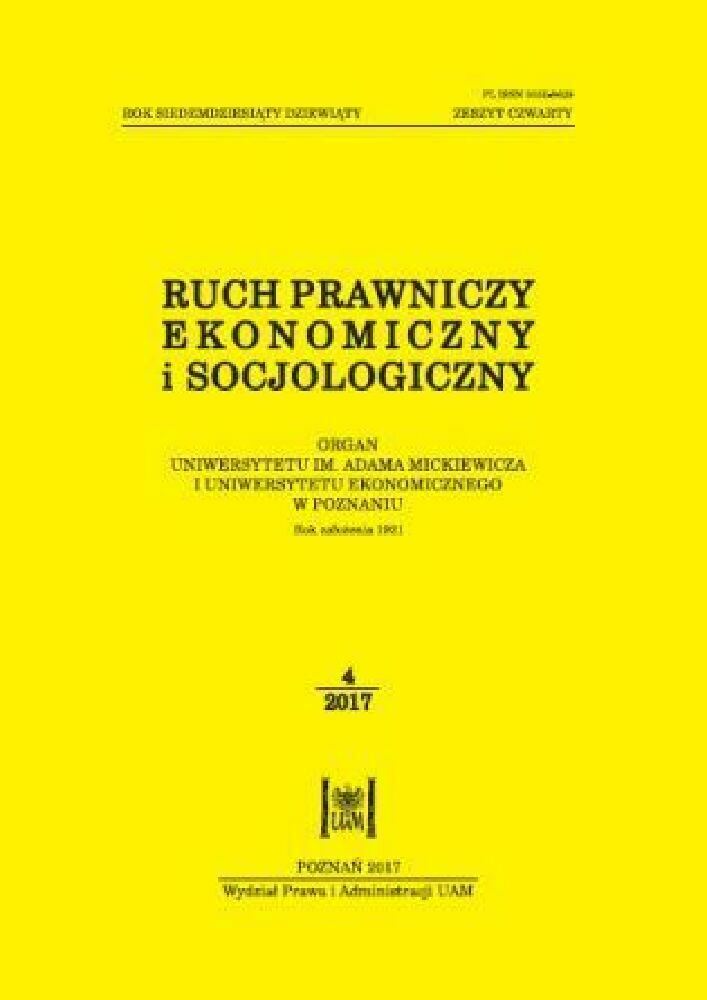Abstract
The aim of this article is to describe two legal cultures, namely the culture of authority and the culture of justification, as formulated by David Dyzenhaus. This distinction between legal cultures proposed by the Canadian theorist of law makes an interesting contribution to the discussion on how to make headway with the problem of determining the limits of public authority and, consequently, the problem of implementing the principle of the separation of powers in such a way that conflicts do not arise. In general, with the culture of authority, justification of the actions of an authority is necessary only when it is being established, and once its authority has been established, the authority sees no further need to justify its decisions. Whereas in the culture
of justification, after an authority has already been established, the rules of the culture of justification require that the authority continue to justify all its decisions. The reconstruction of these conceptions of legal cultures are illustrated by the recently proposed Act on the Supreme Court in Poland. The conclusion of the paper indicates that the proposed changes to the functioning of the Supreme Court are clear examples of legislative action based on the directives of a culture of authority, which may lead to violations of the rule of law.
Funding
NCN Opus 8 2014/2015/B/H/S5/00650
References
Cohen-Eliya, I., Porat, M. (2011), Proportionality and the culture of justification, The American Journal of Comparative Law 59(2): 463-490.
Dyzenhaus, D. (1998), Introduction: why Carl Schmitt?, [w:] Dyzenhaus, D. (ed.), Law as Politic: Carl Schmitt’s Critique of Liberalism, Durham-London: 1-20.
Dyzenhaus, D. (1998), Judging the Judges, Judging Ourselves. Truth, Reconciliation and the Apartheid Legal Order, Oxford.
Dyzenhaus, D. (1998), Law as justification, South African Journal on Human Rights 14(1): 11-37.
Dyzenhaus, D. (1999), Introduction, w: Dyzenhaus D. (ed.), Recrafting the Rule of Law: The Limits of Legal Order, Oxford-Portland-Oregon.
Dyzenhaus, D. (1999), Legality and Legitimacy: Carl Schmitt, Hans Kelsen and Hermann Heller in Weimar, Oxford.
Dyzenhaus, D. (2007), The pasts and future of the rule of law in South Africa, South African Law Journal 124(4): 734-761.
Dyzenhaus, D. (2012), Dignity in administrative law: judicial deference in a culture of justification, Review of Constitutional Studies 17(1): 87ff.
Dyzenhaus, D. (2015), Proportionality and deference in a culture of justification, [w:] Huscroft, G., Miller, B.W., Webber, G. (eds.), Proportionality and the Rule of Law. Rights, Justification, Reasoning, Cambridge.
Hooper, G. (2015), The rise of judicial power in Australia: is there now a culture of justification?, Monash University Law Review 41(1): 102-135.
Hutchinson, A. (1999), Rule of law revisited: democracy and courts, [w:] Dyzenhaus, D. (ed.), Recrafting the Rule of Law: The Limits of Legal Order, Oxford-Portland-Oregon.
Mazur, D., Żurek, W. (2017), Pierwszy rok “dobrej zmiany” w polskim wymiarze sprawiedliwości/ The judiciary in Poland at the threshold of 2017: challenges and threats, Ruch Prawniczy, Ekonomiczny i Socjologiczny 79(1): 25-38; doi:http://dx.doi.org/10.14746/rpeis.2017.79.1.2.
Michelman, F.I. (2010), Legitimation by constitution (and the news from South Africa), Valparaiso University Law Review 44(4): 1015-1034.
Mureinik, E. (1994), Bridge to where? Introducing to interim Bill of Rights, South African Journal on Human Rights 10(1): 31-48.
Walluchow, W. (2013), On the Neutrality of Charter Reasoning, [w:] Beltran, J.F., Moreso, J.J., Papayannis, D.M., Neutrality and Theory of Law, Dordrecht-Heidelberg-New York-London.
Werhan, K. (2012), Popular constitutionalism, ancient and modern, UC Davis Law Review 46(1): 65-131.
Young, L. (2017), Democratic Dialog and the Constitution, Oxford.
Zajadło, J. (2017), Sumienie sędziego/ Judicial conscience, Ruch Prawniczy, Ekonomiczny i Socjologiczny 79(4): 31-41; doi:http://dx.doi.org/10.14746/rpeis.2017.79.4.3.
License
Copyright (c) 2017 WPiA UAM

This work is licensed under a Creative Commons Attribution-NonCommercial-NoDerivatives 4.0 International License.




